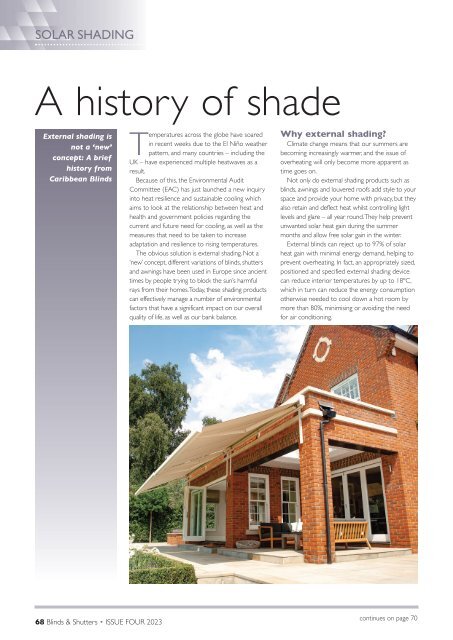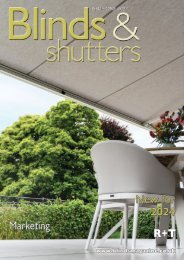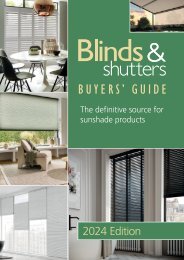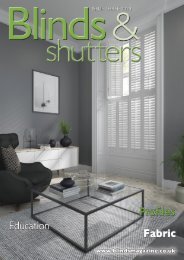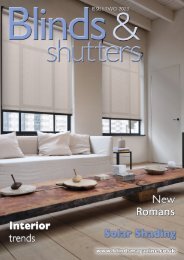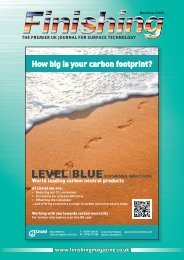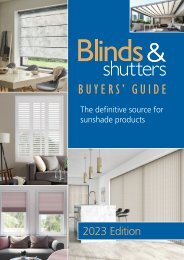Blinds & Shutters - Issue 4/2023
As we reach the end of summer which has not been the greatest in terms of weather it will be interesting to see which way the wind is blowing in regard to the environment as the next general election approaches. I live close to London and the ULEZ extension has been on top of the agenda for many people. The statistics on London’s air quality are extremely worrying with the WHO saying that air pollution far exceeds limits. Do we ignore the evidence and continue to put lives at risk? I would imagine we would not like a polluting business near our home or place of work and it is impressive that blinds companies are stepping up and taking on board their environmental responsibilities. We are all aware that there is a cost involved, but it seems a small price to pay for a healthy future. John Hatcher editor
As we reach the end of summer which has not been the greatest in terms of weather it will be interesting to see which way the wind is blowing in regard to the environment as the next general election approaches.
I live close to London and the ULEZ extension has been on top of the agenda for many people. The statistics on London’s air quality are extremely worrying with the WHO saying that air pollution far exceeds limits. Do we ignore the evidence and continue to put lives at risk? I would imagine we would not like a polluting business near our home or place of work and it is impressive that blinds companies are stepping up and taking on board their environmental responsibilities.
We are all aware that there is a cost involved, but it seems a small price to pay for a healthy future.
John Hatcher
editor
You also want an ePaper? Increase the reach of your titles
YUMPU automatically turns print PDFs into web optimized ePapers that Google loves.
SOLAR SHADING<br />
A history of shade<br />
External shading is<br />
not a ‘new’<br />
concept: A brief<br />
history from<br />
Caribbean <strong>Blinds</strong><br />
Temperatures across the globe have soared<br />
in recent weeks due to the El Niño weather<br />
pattern, and many countries – including the<br />
UK – have experienced multiple heatwaves as a<br />
result.<br />
Because of this, the Environmental Audit<br />
Committee (EAC) has just launched a new inquiry<br />
into heat resilience and sustainable cooling which<br />
aims to look at the relationship between heat and<br />
health and government policies regarding the<br />
current and future need for cooling, as well as the<br />
measures that need to be taken to increase<br />
adaptation and resilience to rising temperatures.<br />
The obvious solution is external shading. Not a<br />
‘new’ concept, different variations of blinds, shutters<br />
and awnings have been used in Europe since ancient<br />
times by people trying to block the sun’s harmful<br />
rays from their homes. Today, these shading products<br />
can effectively manage a number of environmental<br />
factors that have a significant impact on our overall<br />
quality of life, as well as our bank balance.<br />
Why external shading?<br />
Climate change means that our summers are<br />
becoming increasingly warmer, and the issue of<br />
overheating will only become more apparent as<br />
time goes on.<br />
Not only do external shading products such as<br />
blinds, awnings and louvered roofs add style to your<br />
space and provide your home with privacy, but they<br />
also retain and deflect heat whilst controlling light<br />
levels and glare – all year round. They help prevent<br />
unwanted solar heat gain during the summer<br />
months and allow free solar gain in the winter.<br />
External blinds can reject up to 97% of solar<br />
heat gain with minimal energy demand, helping to<br />
prevent overheating. In fact, an appropriately sized,<br />
positioned and specified external shading device<br />
can reduce interior temperatures by up to 18ºC,<br />
which in turn can reduce the energy consumption<br />
otherwise needed to cool down a hot room by<br />
more than 80%, minimising or avoiding the need<br />
for air conditioning.<br />
68 <strong>Blinds</strong> & <strong>Shutters</strong> • ISSUE FOUR <strong>2023</strong><br />
continues on page 70


